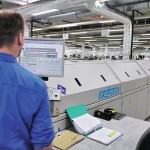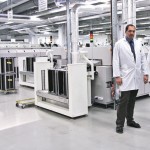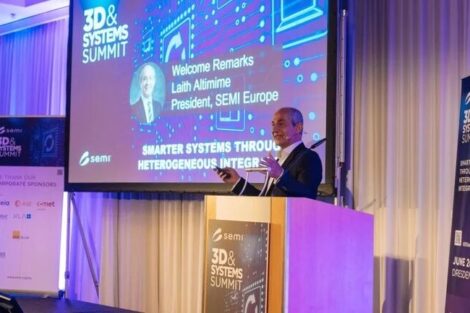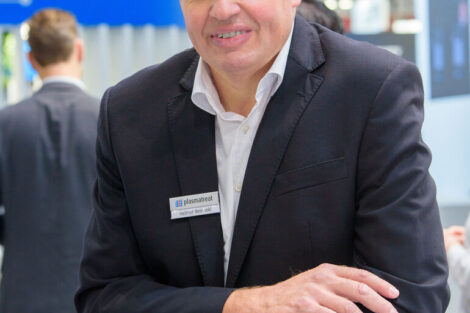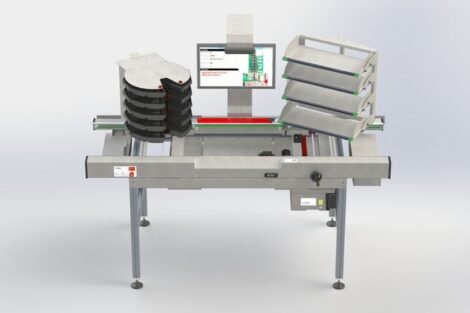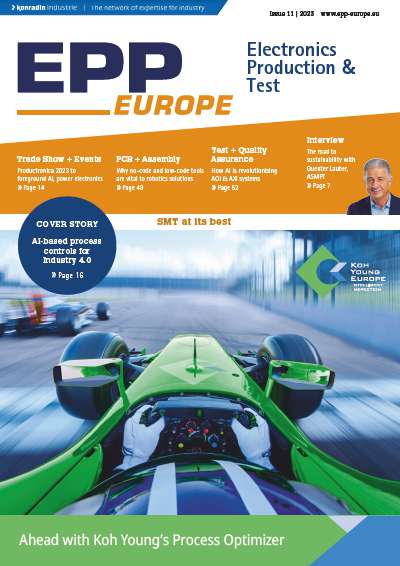Due to decreasing batch sizes and increasing product switching, the electronics industry needs greater flexibility in production. SMD lines must be set up for a wide range of parameters at very short notice whilst consistent product quality is maintained. However, besides adaptable hardware this increasingly requires software-supported line concepts which make it possible to implement efficient line utilisation.
Rehm Thermal Systems, Blaubeuren (Germany)
For reflow production this trend requires a rethink, i.e. a shift away from considering the reflow process in isolation towards an integrated complete solution. As a result, precise monitoring of the soldering processes and well-conceived line connection become as significant as top quality soldering work, which in any case goes without saying. The Japanese manufacturer Sumida is once again turning to Rehm Thermal Systems to help it achieve this.
Since 1991 Sumida has been conducting production activities as an EMS service provider for the electronics industry at the Lehesten plant in the Thuringian Forest. It manufactures a wide range of components for power electronics, industrial electronics and the automotive and medical industries.
Questions to Norbert Rödel, Managing Director, Sumida
At the Lehesten plant a wide range of components are manufactured. What challenges does this present in the production process?
On the one hand a high degree of flexibility is required in the manufacturing process. Our product range has now increased from ten to over 350 assemblies per month and will continue to grow in the future. Since we have to deal with up to 5,000 batch sizes per week, we have to carry out a large number of parameter changes at short notice. For the reflow process it is also important, among other things, to have good heat linkage which makes it possible to solder both heavy and light-build components. We also have to handle a wide range of circuit board materials which require effective cleaning and condensation management.
On the other hand, flexible production management is also necessary. We are now going to successively harmonise our equipment, so maintenance and operating processes will be greatly simplified for our employees. As a result, once knowledge has been acquired it will be possible to transfer it directly and apply it easily. This is why we decided to purchase five identical reflow systems from Rehm for this cross-investment too.
Which systems did you purchase and why did you choose Rehm Thermal Systems?
Our current investment involves five series VXP nitro 3500 systems with pyrolysis, adjustable transport width and central support. Because this decision concerned an investment for at least ten more years, it was important for us to choose a reputable manufacturer with a high quality level and proven technology. In this respect Rehm Thermal Systems has proven to be the right partner since the first time we purchased a system over 15 years ago. This time we were particularly happy that Rehm was able to provide a complete solution which we did not have before.
What does the complete solution consist of?
Firstly, a new cooling concept was a key issue for us. As part of the harmonisation process we also wanted to switch to a central cooling system. In consultation with fob-Kälte GmbH, Rehm Thermal Systems developed a suitable solution. Three compressors outside the production halls channel the refrigerant through fine copper pipes directly to the five production lines. It was therefore possible to forego water pipes and cooling units in the production process. Besides saving space, we were also able to considerably reduce the noise level. Even though the lines are supplied centrally, each soldering system can still be separately regulated. Finally, maintenance outlays are now concentrated on a single system instead of several different ones, which also reduces downtime.
Secondly, we wanted to improve our process control, and the cooperation between Rehm Thermal Systems and KIC made this possible. Following the additional integration of the KIC software into the soldering systems we have additional control and monitoring options at our disposal. For example, the specification of each individual circuit board can be verified and stored, resulting in full traceability. Through direct server connections, we will in the future be able to centrally manage all profile and process data. For both of these objectives, Rehm took on responsibility for the project and organised the installation, training and maintenance.
In your opinion, what else is needed for modern SMT production besides good equipment?
Besides well-trained and motivated staff, these days sustainability is the main consideration in production. As a member of the Thuringia Sustainability Accord our carbon footprint is very important to us and we therefore also invest in environmentally-friendly production systems. The new systems have enabled us to reduce nitrogen consumption in the soldering process by around 25 per cent. The residue in the systems has also significantly decreased due to the use of pyrolysis, which in turn leads to a reduction in maintenance work and therefore less downtime. We also hope to make substantial energy savings of up to 30 per cent thanks to the use of the new cooling system.
How do you think the global electronics market will develop? Where do you see opportunities?
For power electronics, i.e. for drive technology in the automotive and industrial electronics sectors, I think that Europe will continue to be a strong, sustainable market. As an EMS service provider based in Germany we therefore primarily focus on manufacturing technologically high quality products. A major challenge is the trend towards small series, which in the current market require rapid retooling. As far as the production of assemblies for consumer electronics is concerned, I think that Asia will take the lead, China in particular.
Thank you for your valuable time.
Zusammenfassung
Ökonomische und ökologische Nachhaltigkeit sind eng miteinander verbunden. Auch in der SMD-Fertigung der Sumida Lehesten gewinnt das Thema zunehmend an Bedeutung. Ein Grund, warum das Unternehmen bei Neuinvestitionen im Bereich Löten auf eine Komplettlösung setzt.
Les effets durables économiques et écologiques sont étroitement liés. Dans la fabrication SMD de la société Sumida de Lehesten, ce sujet prend de plus en plus d’importance. C’est une raison pour laquelle l’entreprise met l’accent sur une solution complète en ce qui concerne les nouveaux investissements dans le domaine de la soudure.
Share:


